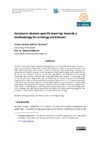Please use this identifier to cite or link to this item:
https://accedacris.ulpgc.es/handle/10553/70371
| DC Field | Value | Language |
|---|---|---|
| dc.contributor.author | Ureña Gómez-Moreno, Pedro | en_US |
| dc.contributor.author | Mestre-Mestre, Eva M. | en_US |
| dc.date.accessioned | 2020-02-19T15:40:49Z | - |
| dc.date.available | 2020-02-19T15:40:49Z | - |
| dc.date.issued | 2017 | en_US |
| dc.identifier.issn | 1133-1127 | en_US |
| dc.identifier.uri | https://accedacris.ulpgc.es/handle/10553/70371 | - |
| dc.description.abstract | At the current rate of technological development, in a world where enormous amount of data are constantly created and in which the Internet is used as the primary means for information exchange, there exists a need for tools that help processing, analyzing and using that information. However, while the growth of information poses many opportunities for social and scientific advance, it has also highlighted the difficulties of extracting meaningful patterns from massive data. Ontologies have been claimed to play a major role in the processing of large-scale data, as they serve as universal models of knowledge representation, and are being studied as possible solutions to this. This paper presents a method for the automatic expansion of ontologies based on corpus and terminological data exploitation. The proposed “ontology enrichment method” (OEM) consists of a sequence of tasks aimed at classifying an input keyword automatically under its corresponding node within a target ontology. Results prove that the method can be successfully applied for the automatic classification of specialized units into a reference ontology. | en_US |
| dc.language | eng | en_US |
| dc.relation.ispartof | LFE. Revista de Lenguas para Fines Específicos | en_US |
| dc.source | LFE. Revista de lenguas para fines específicos [eISSN 2340-8561], v. 23 (2), p. 63-85 | en_US |
| dc.subject | 570107 Lengua y literatura | en_US |
| dc.subject | 550510 Filología | en_US |
| dc.subject.other | Ontology learning | en_US |
| dc.subject.other | FunGramKB | en_US |
| dc.subject.other | Corpus | en_US |
| dc.subject.other | Terminology | en_US |
| dc.subject.other | Biology | en_US |
| dc.title | Automatic domain-specific learning: towards a methodology for ontology enrichment | en_US |
| dc.type | info:eu-repo/semantics/article | en_US |
| dc.type | Article | en_US |
| dc.identifier.doi | 10.20420/rlfe.2017.173 | en_US |
| dc.investigacion | Artes y Humanidades | en_US |
| dc.type2 | Artículo | en_US |
| dc.identifier.ulpgc | Sí | es |
| dc.description.esci | ESCI | |
| dc.description.dialnetimpact | 0,0 | |
| dc.description.dialnetq | Q3 | |
| dc.description.dialnetd | D6 | |
| dc.description.erihplus | ERIH PLUS | |
| item.grantfulltext | open | - |
| item.fulltext | Con texto completo | - |
| Appears in Collections: | Artículos | |
Page view(s)
60
checked on May 4, 2024
Download(s)
89
checked on May 4, 2024
Google ScholarTM
Check
Altmetric
Share
Export metadata
Items in accedaCRIS are protected by copyright, with all rights reserved, unless otherwise indicated.
